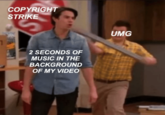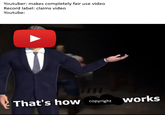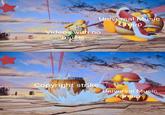UMG Copyright Strikes
Confirmed 12,336
Overview
UMG Copyright Strikes refers to the ongoing controversy regarding the Universal Music Group's (UMG) continued vigilance in removing videos that contain potentially copyright music material from YouTube. Since about 2011, YouTubers have complained about their videos being protected on under fair use copyright laws but have largely been unsuccessful in protecting their material.
Background
On March 29th, 2009, Google. launched VEVO on YouTube, a music video channel that would host fully-licensed music videos that would not be threatened by copyright takedowns. The deal was part of a partnership between Google and YouTube, making it a separate agreement from the Digital Millennium Copyright Act (DMCA).
YouTube's Partnerships Director Chris Maxcy wrote in a statement:[1]
We're hopeful that this partnership will set a positive example of how the digital and music industries can work together. Moreover, VEVO gives users a deeper, more immersive music experience. As part of the agreement, we've renewed and extended our deal with UMG to allow users to continue creating and watching videos containing UMG sound recordings and Universal Music Publishing Group’s compositions in various territories around the world. You'll even be able to buy favorite tracks on the spot with our Click-to-Buy feature.
Developments
"Megasong" Dispute
In 2011, Kim Dotcom, the founder of Megaupload, released the "Megasong," a collaboration with numerous members of the recording industry, including Kanye West, Snoop Dogg, Alicia Keys and more (shown below). The promotional video trended on Twitter but was removed by the UMG that day.
That day, Megaupload CEO David Robb said of the removal:[2]
Let us be clear: Nothing in our song or the video belongs to Universal Music Group. We have signed agreements with all artists endorsing Megaupload. Efforts to reach out to UMG and open a dialog about this abuse of the DMCA process were answered with unfounded and baseless legal threats and demands for an apology.
On December 13th, Megaupload sued UMG over the video's removal.[4]
However, UMG's lawyer Kelly Klaus argued that the song was not taken down in accordance with the DMCA, but rather UMG's partnership with VEVO. They argue that they have the ability to remove material that would otherwise not be covered under DMCA.[3] UMG argued that the "Megasong" video was removed in compliance with the UMG-YouTube agreement, giving UMG "the right to block or remove user-posted videos through YouTube's CMS based on a number of contractually specified criteria."
YouTube refuted UMG's argument, telling Ars Technica:
Our partners do not have the right to take down videos from YouTube unless they own the rights to them or they are live performances controlled through exclusive agreements with their artists, which is why we reinstated it.
On January 21st, 2012, amid other mounting legal pressure for the company, Megaupload dropped their lawsuit against UMG.[5]
Fair Use
On June 27th, 2014, mashup artist and YouTuber Elisa Kreisinger posted an editorial on The Daily Dot [6] about a remix video they made and UMG's decision to remove it from YouTube. Assuming that the video would be protected under "fair use," a copyright law "hat permits the use of pop culture source materials without the permission of the copyright holder for a variety of uses: comment, critique, satire, homage, or to further a cultural discussion," the author protested to have the video reinstated. After a 10-month dispute, Kreisinger learned that under UMG's "private contract" with YouTube and Google, they were under no obligation to abide by "fair use" as designated within DMCA.
In a response from YouTube, the company stated, "YouTube has a contractual obligation to this specific copyright owner that prevents us from reinstating videos in such circumstances. Therefore, we regretfully cannot honor this counter-notification. Your account will not be penalized at this time."
Kreisinger comprehended this response to mean "YouTube’s private agreement with Universal Music Group eliminates creator’s fair use rights on the site. That’s why [their] counter-notification didn’t matter. Once Universal Music Group said no, YouTube ended the conversation."
Facebook Deal
On Decmeber 21st, 2017, Facebook and UMG struck a multiyear licensing deal that would allow UMG to send takedown notices to people on the social media platform.[7] The deal would also apply to content on Instagram and Oculus.
Meme Usage
The growing recognition of UMG's takedown notices grew into a series of jokes in the form of "object-labeling memes," generally following the format of UMG forcing YouTubers to remove entire videos for using only a small amount of copyrighted material (examples below).



Search Interest
External References
[1] Google – Announcing VEVO, a Partnership with Universal Music Group
[2] Torrent Freak – Megaupload to Sue Universal, Joins Fight Against SOPA
[3] Ars Technica – UMG claims 'right to block or remove' YouTube videos it doesn’t own
[4] TechDirt – Megaupload Sues Universal Over Questionable Video Takedown, As Will.i.am Says He Sent Takedown Too
[5] The Hollywood Reporter – Megaupload Drops Lawsuit Against Universal Music Over Viral Video
[6] The Daily Dot – The impending death of the YouTube mashup
[7] Financial Times – Facebook and Universal strike music licensing deal





Comments ( 3 )
Sorry, but you must activate your account to post a comment.
Please check your email for your activation code.